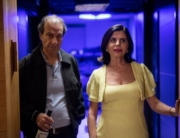Cinema Sabaya is directed by Orit Fouks Rotem in an effortlessly authentic faux-documentary style, so much so that it often feels like the real thing. On the surface, it seems like a fairly obvious story about women from different backgrounds finding common ground and building community. Luckily, this is no straightforward kumbaya story. The complexity is hinted at by the title itself—sabaya, which, depending on how it is pronounced, means a group of young women or prisoners of war. The director explores that doubleness of its meaning.
Those who love to talk about how privilege is problematic so often fail to consider their own privilege, and this film explores that gap in a refreshing way. Rona (Dana Ivgy), a young Israeli filmmaker, teaches at a community education space called the Center for Social Equality, which is part of the larger Coexistence Center. (A name perhaps intentionally bringing to mind those cringe interfaith bumper stickers that were popular in the 1990s.) The local women taking her basic filmmaking class come from a range of backgrounds—rich, poor, married, single, Arab, Jewish, bisexual, traditional.
In the opening scene, Rona’s social position, and its entanglement in nepotism and politics, is spelled out. Prior to the first class, Lubna (Khawla Hag-Debsy), the manager of the center, introduces Rona to her students as an experienced director. She then adds that she knows about the filmmaker not through her work, but through Rona’s mother, an advisor to the mayor on women’s rights. Rona’s very existence—as a possibly unqualified, politically connected person—is itself a critique of privilege.
Additionally, the classes are held in Hebrew instead of Arabic, though most of the students speak Arabic. When an outspoken student questions why, Lubna explains that this is because the Arabic speakers all know Hebrew, but the Hebrew speakers do not know Arabic. This is said matter-of-factly—as if it were obviously and perfectly fair, when the opposite is really the case. Lubna refers to the students as sabaya during her introduction before the first class starts, and Rona asks her students what that word means. Her Arabic students explain it to her, in Hebrew.
From the start, it’s pretty clear that Rona doesn’t seem to have much knowledge to share, and frequently loses control of the class. As the course goes on, and the students share more of their lives as part of their homework—videos about their lives—they begin to all trust each other. But the film is not simply a straightforward celebration of the power of sharing and openness. Rather, it points out how risky it can be to be open with people you don’t actually know that well. Though the students all gain perspective and understanding, it comes at the cost of being too familiar with each other in ways that might spark unforeseen reactions.
Getting too close too fast, opening up too much, can perhaps lead to someone being taken advantage of. This happens as the group therapy–like discussions go on, and the women reveal too much, boundaries are crossed, and tension boils over. There’s also the question of what Rona’s real motives are: Is she really there to teach, or is she encouraging her students to be frank and sincere because their stories make for valuable material for her own work?
A film that explores the complexities of privilege and honesty with rare boldness, Cinema Sabaya is more than it appears to be.

















Leave A Comment